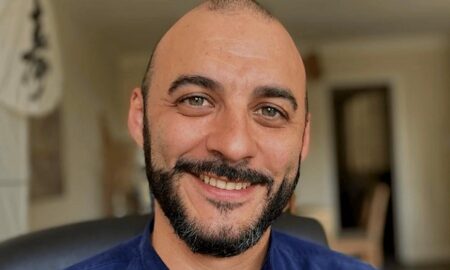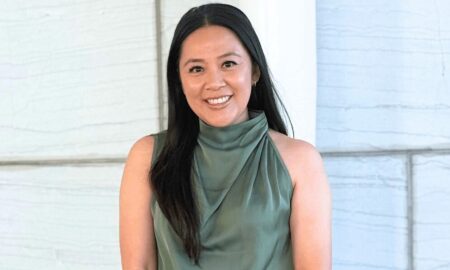

Today we’d like to introduce you to Brian Smail III.
Brian, please share your story with us. How did you get to where you are today?
If you know me, you know that I’m a plumber’s son from Connecticut and that I’m super proud of it. After that, I’m a filmmaker, actor, and photographer.
My parents are as small-town, blue-collar as it gets. They own a plumbing company that services all over CT – and they’re the only two employees. My old man’s the plumber, my ma’s the secretary. Before them, my grandparents are first-generation Italian immigrants who made the journey across the Atlantic when they were 19. My older sister was the first in the family to attend college; most of my kin hadn’t even graduated high school. From day 1, I was taught to work and work hard.
My sister was a big theater girl and pageant star growing up so I was introduced to the arts early in my formative years. I did a few shows, took a few dance classes, and even won a pageant myself (Little Mr. Wolcott 2002 represent!). It wasn’t until I got to high school, though, that I really got into theater myself.
My parents, always saying “all we want is for you to do better than us”, enrolled us in Chase Collegiate School, a private day school in Waterbury, CT. It was an incredibly unique blend of the classic New England prep school experience mixed with a tough city backdrop. I received an extraordinary education from faculty who really invested in me and I did 13 theater productions in my four years.
When it came time to apply to college, I didn’t really know what to want. All I knew was that my sister was at NYU majoring in theater, and I remember the rebellious spirit in me refused to follow her footsteps (as silly as that sounds). I wanted to do something that no-one really did – whatever that meant. So when my college counselor asked me what I wanted to do, I kind of impulsively said “I don’t know. Maybe like film school or something in LA?”
I never really watched movies growing up; my parents worked 16 hour days so I usually played video games or watched YouTube by myself. But film seemed close enough to theater where I thought I could figure it out, and next thing I knew, I was moving into the freshman dorms at Loyola Marymount University in the fall of 2015.
Let it be known: the only similarities between film and theater are that people act, direct, and have massive personalities. I quickly felt like I had bit off more than I could chew, but I was much too stubborn to turn around and go back to CT. After all, I was at the same age that my grandparents were at when they had relocated across the world, and the same age when my parents began the foundation of their business – so there was no way I was going to give up on the first real challenge I faced.
I got onto every set I could, started gripping, and learned film from the bottom-up. I’ve always been a believer that if you want to lead, you have to know exactly what it is you’re leading. I worked on 20+ sets in college, kept acting on-stage – and slowly in front of the camera, too – and graduated after three years. Since then, I’ve been directing, writing, acting, and photographing while I try to get my feet planted in the film industry. And, of course, we can’t forget the odd jobs here and there to make ends meet.
We’re always bombarded by how great it is to pursue your passion, etc – but we’ve spoken with enough people to know that it’s not always easy. Overall, would you say things have been easy for you?
I’ve been met with nothing but support my entire life. All my dad ever wanted was for me to be a plumber like him, but he fully supported me heading into the arts. I am always thankful for my family not only following me down a path that they don’t understand but also encouraging me every step of the way. Most people back home don’t know what the film industry entails, yet I’ve never had someone once say, “don’t you wish you did something more practical?” It’s a blessing.
That said, I attribute some of the smoothness to the work ethic that was instilled in me from a young age. B’s weren’t good enough in the Smail house, giving-up was very rarely permitted (this was also the case with midday naps – if the sun was out, it was time to work – but that’s another discussion). My parents always told me about their struggles to afford basic necessities at my age so I knew I couldn’t waste the platform I had been given.
Really, the hardest part of this path is trying to break into the film industry with very few connections. When I moved to LA in 2015, I was completely alone. College was a great first step as it introduced me to my filmmaking peers that I know I’ll work with for the rest of my life, but beyond that I’m still trying to get my foot in the door. I have faith though that my short film, “Checks and Balance”, will help me do that.
We’d love to hear more about your work and what you are currently focused on. What else should we know?
I currently don’t have a company; most of the work I do is freelanced/independent. I do a lot of multimedia work to pay the bills, but my specialties are in writing, directing, and acting. My grand plan is to eventually establish a film development company centered on small-town stories.
For my most recent film work, I wrote, directed, produced, and acted in the short film Checks and Balance. The logline is: “ A group of forgotten seniors at a private high school create a mafia-esque scheme of stealing test answers and selling them for money. However, as this operation overtakes the school’s social hierarchy, these once overlooked students get lost in their newfound wealth and power.”
As I was nearing the end of my college experience, I really wanted to have a project to plant my roots into. I was in a film studies class about New York film, and I had the privilege of taking that class with Barry Primus, an actor who had worked with Martin Scorsese on Boxcar Bertha. He showed us “Mean Streets” and I immediately felt a cosmic push rattle me in my seat. Something about how raw it was, how the characters were unapologetic products of their surroundings reminded me of the culture I grew up in. I finally felt like I had found a frequency that I could resonate with. After the film ended, Mr. Primus shared an anecdote about the crew of Mean Streets; not the stars we know them as, but the lost young adults that they were – he said, “for them, they had to make this movie. Because if they didn’t do it if they didn’t get it funded and made, they thought they were truly going to die.” That weekend, I locked myself in my apartment and wrote the first 120-page draft of Checks and Balance in 4 days.
I was always taught to write what I know, and this was a great intersection of so many concepts I wanted to explore. I wanted to examine what it means to be a student in modern high school, where stakes seem to be impossibly high socially and academically, and where kids leave their childhoods behind early to conform to a social media image. I wanted to examine the dynamic of prep school, where predominantly white kids flaunt their parents’ money everywhere to push other people down (a concept not restricted to high school). And I wanted to tell a New England story, one that was truly and authentically me.
Since then, I have been writing, re-writing, and re-writing again. Last summer, I ripped 12 pages out of the middle of the script, crowdfunded a budget, and made a proof-of-concept version of the story. I wanted something concrete to show possible investors, something that says, “my crew and I may be young, but this is a story about youth. And no one is going to tell it better than us.” Now the ball’s in their court.
For the future, film-wise we’re a few weeks away from hearing back on our first festival submissions. No matter the turnout for this film, I’ll always be proud of the journey. I have high hopes that this project can be a very excellent festival film, and that it can blossom into the full-length project it deserves to be.
Personally, I’m looking forward to a new era in LA. I lived in Playa Vista for my first four years of being in California, which was a very unique experience and one I’m thankful I had. But I grew up taking Metro-North into Manhattan, and I needed to find a spot in LA that gave me both the classic city feel while still being a part of the Angelino culture. So when I moved to DTLA last June, I fell in love with the city again. Getting to walk around and see people hustling and bustling pushes me to work harder. I’ve met some great people, been to some excellent food spots, and found some exemplary small businesses. I can’t wait to continue to explore and grow. And if anyone has food recommendations, I’m all ears.
Has luck played a meaningful role in your life and business?
I’m a firm believer that you can define luck as whatever you want. When I was in college, I used to wake up and write down “I’m the luckiest guy in the world” (my roommates thought I was straight out of The Shining but I didn’t care) as a reminder of what it took for me to get where I am. I’ve worked for a lot, and a lot has gone right on its own. I like to think it’s a symbiotic process of one influencing the other. At this point, I can’t really tell which is which – I’m just thankful that it’s all happened. All experiences to me are vital, whether good or bad. No matter how bad a day maybe, I’ve found my passion, turned it into a career, and have had nothing but support for it. If that’s not lucky, I don’t know what is.
Contact Info:
- Website: briansmailiii.com
- Email: briansmail212@gmail.com
- Instagram: https://www.instagram.com/smailthethird
- Facebook: https://www.facebook.com/checksandbalancefilm






Image Credit:
Brian Smail III, Tim Vasallo, Grant Gadbois, Jasmin Riedel
Suggest a story: VoyageLA is built on recommendations from the community; it’s how we uncover hidden gems, so if you or someone you know deserves recognition please let us know here.



















